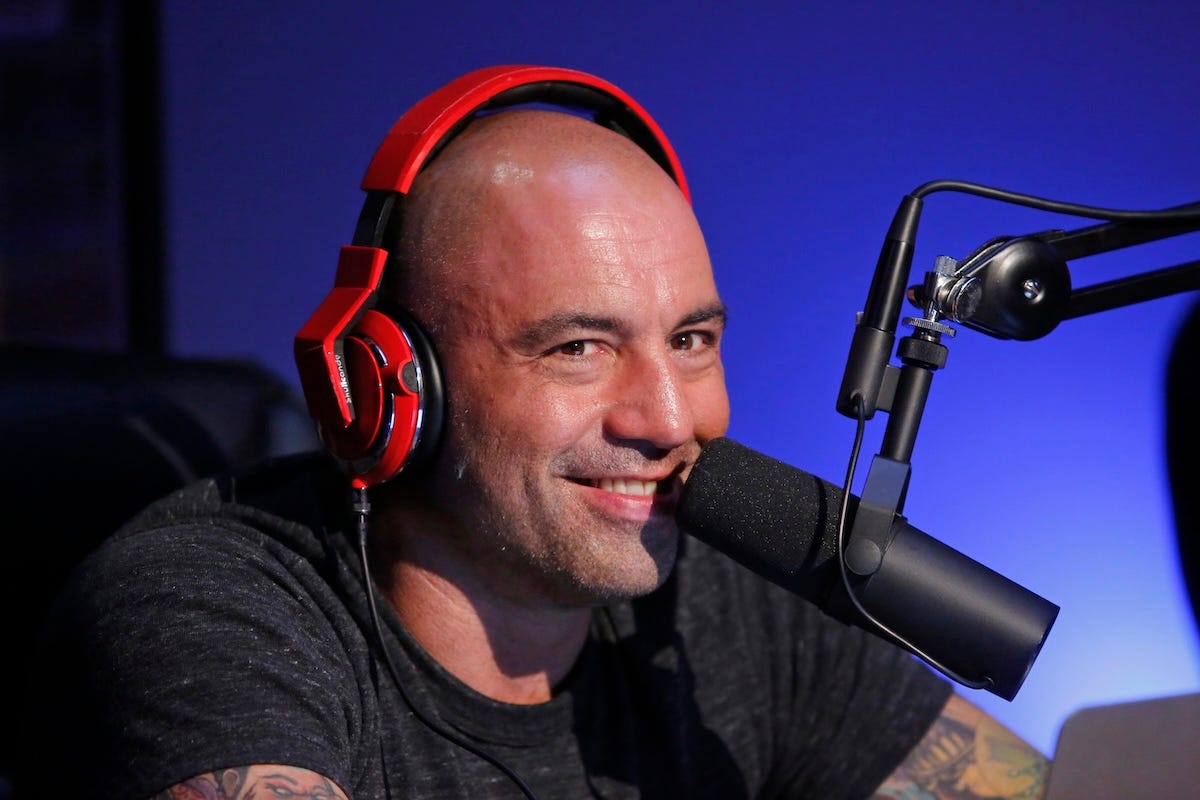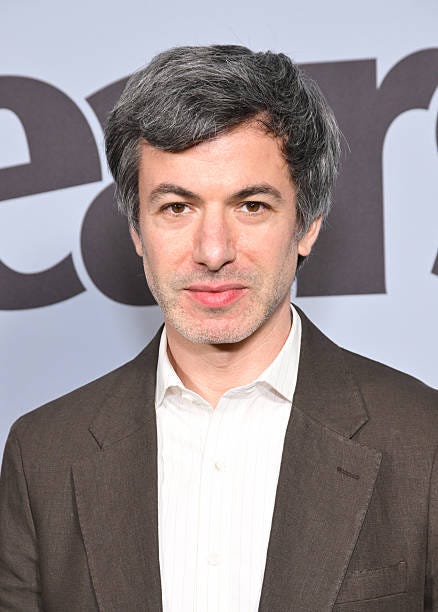Welcome To The "Liberal Joe Rogan" Olympics
Introducing this week's contestants.
If you’re worried about the future of the Democratic Party and you’ve spent some time on the Internet, chances are you’ve heard this argument: Democrats need their own Joe Rogan.
Officials within the Democratic Party seem to share that belief, and have reportedly asked mega-donors to pour tens of millions of dollars into boosting liberal content creators who might replicate Rogan’s reach and influence. The obvious flaw in this strategy is that the voters drifting from the Democratic Party are mostly lower-information voters, and, in the case of Rogan’s audience, far more likely to consume brain pills than progressive messaging.
So Democrats aren’t going to reach these people by pumping millions of dollars into the pockets of already-successful influencers like Brian Tyler Cohen. Because, as anyone who’s ever talked about politics at a party knows, there’s nothing politically apathetic people hate more than listening to someone talk about politics. That said, it would be nice to have a new-media megapersonality willing to slip a little liberalism into the mix without making it feel like homework. This person wouldn’t be paid to churn out propaganda. But ahead of the 2026 midterms and 2028 election, they could spotlight issues that favor Democrats—perhaps by interviewing NIH scientists whose promising cancer research got obliterated, or small business owners crushed by tariffs.
The only question is, who should this person be?
PRESENTING: THE DEMOCRATIC JOE ROGAN OLYMPICS
Each contestant below has been ranked by three criteria:
Audience: Two things to consider here. Is the contestant’s audience large? And is it full of persuadable or apolitical voters—the kind that Democrats seem to be losing? A recent survey found that the majority of Rogan’s audience is 18-34, nearly 80 percent male, and 35 percent independent (with the remainder nearly evenly split between the two major parties). The Democratic Joe Rogan needs an audience that bears some resemblance to this.
Ability (to be a Democratic sleeper agent): Does the audience assume the contestant is already liberal? Or might they get away with slipping innocuous pro-Democratic messaging like “Those Medicaid work requirements seem kinda evil” or “Why’d Trump tax bananas, we can’t grow those in Detroit,” into their content without sounding like Chris Hayes? (No offense, Chris Hayes, but you’re not winning over swing voters.)
Willingness (to get on board): In theory, the ideal Democratic Joe Rogan is Joe Rogan. But that ship seems to have sailed right into Mar-a-Lago harbor. So we need to assess whether these candidates actually would want the job.
Now, without further ado… the candidates!
Bill Simmons: The Sports Guy
Audience: 6/10
Ability: 7/10
Willingness: 6/10
The case for: To everyone who’s dropped a great sports take into their group chat and thought, for one happy moment, “maybe I can make a career of this!”: You should be jealous of Simmons.
The self-proclaimed “Sports Guy” actually pulled it off. He turned that exact delusion into a job, then turned the job into a media empire. Countless men in their 20s and 30s (myself included) owe their long-abandoned sports blogspots to him. And since the rise of online sports betting, countless more now recognize Simmons as the face of the gambling company FanDuel.
If Bill started talking politics a bit more on his incredibly popular tri-weekly podcast, would it actually move some votes? Well, guys like sports. Guys like sports gambling. So guys probably trust Bill Simmons, right?
The case against: According to the analytics firm Lower Street Advertising, Simmons’ podcast audience skews heavily toward white men in their early thirties who are into sports, movies, and prestige TV. This is an audience that I like to think of as Cosmopolitan Dudes. They love classic movies from the 90s, salivate over HBO’s latest prestige TV shows, and are generally college-educated with high incomes.
In other words, they’re libs.
There are surely more Trump supporters in Simmons’s audience than Rachel Maddow’s. But probably not enough to compete with Rogan for influence. Put another way: If you’re willing to listen to a three hour multi-part podcast breaking down Severance, you’re probably not a Trump supporter.
Andrew Huberman: Internet Health Guy
Audience: 8/10
Capacity: 9/10
Willingness: 3/10
The case for: A few years ago, I got a call from a friend. He’d been following the morning routine of health influencer Andrew Huberman—hydrate, no phone, no caffeine, get direct sunlight—and it had changed his life. To be specific, he scorched his eyes by staring too directly at the sun.
I haven’t seen that guy in a while. But every time I look at the sun (indirectly) or see an Andrew Huberman video, I think about how my friend nearly fried his retinas on the advice of the internet’s most prominent health guru. To be clear, this was a misinterpretation of Huberman’s advice to get “morning sunlight.” But it underscores how devoted the Huberman audience is, because my friend is not an isolated case. The “Huberman Husband Phenomenon” has turned millions of men in their 20s, 30s, and 40s into a legion of life-hackers and health fanatics. And in today’s political climate, that’s a demographic that can swing elections.
Now, imagine if he told his 6.5 million youtube subscribers that the Republican Party was anti-health: that they kicked ten million people off their health insurance, defunded research into life-saving and life-enhancing treatments, and, perhaps worst of all, appointed a seed-oil lobbyist to be Chief of Staff at the Department of Agriculture.
The case against: Huberman seemingly wouldn’t want the assignment. He’s promoted Elon Musk and other pro-Trump figures in the past and has openly discussed his disinterest in politics. Make no mistake, he’s not a MAHA nut, but he’s also conspicuously silent about the anti-vaccine and anti-science movement that has overtaken the Republican Party.
I wish that weren’t the case! But think about what Michael Jordan said when asked why he didn’t weigh in on politics: “Republicans buy sneakers too.” Andrew Huberman seems to be making a similar business decision, “Republicans buy unregulated supplements, too.” More than most, maybe…
Dawn Staley: Legendary Women’s College Basketball Coach
Audience: 6/10
Capacity: 5/10
Willingness: 4/10
The case for: Listen, some might dismiss this pick on the grounds that a Rogan-like audience probably wouldn’t tune into women’s college basketball. And fair enough. The sport’s viewership ratings might be up 41 percent in the past two years, but the audience overlap is probably minimal.
Still, I think there’s a strong case for the South Carolina women’s basketball coach. First off, Staley’s probably the only coach in basketball history who is more intimidating than the players on the court. She grew up in the projects of North Philly and built a career as one of the greatest college coaches of all time. She’s a proven winner, and watching her bark at referees is both hilarious and, I imagine, quite terrifying from the receiving end.
Beyond the sidelines, she brings a lot to the table: Openly religious, southern, and grounded in a way that betrays none of the cosmopolitan stench of so many national Democrats. I went back and listened to some episodes of her now-defunct podcast, where she interviewed everyone from Allen Iverson to U.S. Army General Martin Dempsey. That’s Rogan-level range.
The case against: The biggest challenge here is that Staley has already expressed support for Kamala Harris and spoken out in favor of various political causes. That’s a problem if she’s going to win trust from non-political listeners or viewers. It isn’t an impossible bar to clear, but it does mean she’ll ll need to drop some heterodox takes to prove her independent bonafides.
The second big issue is that Staley’s still a full-time coach, and, outside of press conferences, she doesn’t do much public-facing media. If she were going to make a real run at this, she’d probably need to retire and get into the takes game full time. But with three national championships under her belt, she’s got nothing left to prove in basketball. Someone just needs to make the pitch: it’s time to train that fire on the biggest opponent in America, the Republican Party.
Luke Nichols: The Outdoor Boy
Audience: 9/10
Capacity: 10/10
Willingness: 4/10
The Case For: Nichols has built an audience of 12 million YouTube subscribers doing things like hiking 22 miles through a blizzard without a tent, camping with coyotes, and digging snow fortresses by hand. There’s a sizable population of politically disaffected men on the internet who fetishize such survivalist adventures, and Nichols is their patron saint.
But the Outdoor Boy is much more than that. Nichols also went to law school at George Mason and edited BYU’s political science journal, which means he’s a Mormon outdoorsman with a quiet interest in politics—a Never Trump Sleeper Agent, if you will.
Imagine if he took Donald Trump, Jr., on one of his adventures, just to see how the trust fund outdoorsman performed in real conditions. He could casually ask him why his dad is rolling back clean water protections while they dig a snow fort in an Alaskan blizzard.
The Case Against: Unfortunately, Nichols decided to shutter his outdoor channel two weeks ago, citing his desire to step out of the limelight and spend more time with his family. That doesn’t really sound like someone who’s willing to boost his profile and become a sub rosa political influencer.
BUT, in his goodbye video he specifically said he’d stop making videos “for a while.” Not permanently? You’re telling me there’s a chance? Democrats need to keep this guy’s file on hand until he’s ready to make his internet comeback.
Nathan Fielder: Weirdo
Audience: 4/10
Capacity: 4/10
Willingness: 6/10
The case for: This is a strange candidate. Fielder is a deeply unsettling person. He doesn’t have a podcast, he barely posts online, and he has morgue-owner energy. But thanks to The Rehearsal, his gloriously deranged HBO series, he’s wormed further into American pop culture than anyone might have reasonably predicted. And depending on how you interpret Season 2, and his subsequent appearances on CNN, he might actually be on track to reform the Federal Aviation Administration. One might even call him a crusading government reformer. Like Ralph Nader, but weirder.
If you haven’t watched the show, here’s the gist: Fielder builds absurdly elaborate sets to simulate real-life social interactions. The scenarios he creates are surreal, uncomfortable, and often expose bizarre contradictions in people’s behavior. That’s the key: I don’t know about you, but I can’t think of anything more bizarre and contradictory than the Republican Party.
Comedy rarely moves voters (SNL hasn’t persuaded anyone since Gerald Ford fell down the stairs). But get Fielder in a room with Matt Walsh, Mencius Moldbug, Bronze Age Pervert, and the thought-leaders powering the intellectual engine of the GOP and hit record. America deserves to see what happens.
The case against: Even if Fielder were able to pull off a high-level stunt at the expense of the GOP, the right audience still might not see it. That’s because, at his core, he’s an indie comedian who entertains liberals. YouTube clips of his show reach tens of millions of views, as do reels on TikTok and Instagram, so his work probably trickles into the consciousness of people who don’t have HBO subscriptions. But for him to impart any durable political truths to an apolitical audience, he’d need to pull off a really epic stunt.
That’s why Fielder’s the worst contestant in these games. I’d still love to see him create a season of television dedicated to exposing the weirdness and contradictions of the Republican Party. But, at the risk of stereotyping, I suspect his humor and satirical styles will be lost on the average swing voter.
Joey Diaz: Rogan Disciple
Audience: 8/10
Capacity: 10/10
Willingness: 2/10
The case for: Joey Diaz is sort of the Cuban Joe Rogan. He’s a professional comedian whose voice sounds like gravel soaked in whiskey, dusted with cigar ash. Like Rogan, he exudes a working-man vibe—an anti-caricature of the prototypical Democrat. He’s what the party thought it had with John Fetterman. But where Fetterman feels kind of bleak and medically concerning, Diaz is wild in a way that’s charming and fun to be around.
Also, like Rogan circa 2015, Diaz is prone to ranting about how the political system is stupid and not worth caring about. But unlike Rogan, he hasn’t fallen into the rabbit hole of Republican anti-thought. What he needs is a bigger platform and a reason to start bashing Republicans from time to time. This one’s a reach, but Democrats need an authentic and anti-PC comedian on their side, and Diaz is top of the line.
The case against: The case against Diaz is similar to the case for Diaz. The man clearly despises politics and has never expressed much interest in which party controls Washington. I wish someone with Diaz’s audience and unimpeachable apolitical reputation would start supporting Democrats the same way Joe Rogan started supporting Republicans, but a partisan turn like that seems unlikely.
What did we learn?
So, who should be the Democratic Joe Rogan? Honestly, any of these people would do (except Nathan Fielder). The purpose of this exercise was really to identify the types of entertainers and pop-culture figures Democrats ought to start welcoming back into their tent, offering places of prominence.
But the best names on this list are also the least likely to join the cause, and that’s the problem.
Back in 2008, it wouldn’t have been that hard to imagine someone like Diaz or Huberman backing Democrats. The party wasn’t as ideologically rigid back then, and its leader was a once-in-a-generation cultural phenomenon who actually seemed cool.
That’s the real lesson for Democratic mega-donors: the next Joe Rogan isn’t going to be some already-prominent liberal commentator with a bigger budget. It’s going to be an apolitical internet star who decides the Democratic Party is a worthy cause rather than brand poison.










There is no “liberal Joe Rogan” because Joe Rogan is not a political commentator. His political leanings are a SYMPTOM, not a cause.
Really, I bet Rogan himself can be won back. I don’t know if people get how non-ideological that meathead really is. (He might be too “audience captured” at this point though, I dunno.)
What we need is for Rogan to piss off Trump somehow so that Trump goes off on him. That’s the kind of thing that moves guys like Rogan, many of whom did, genuinely, start voting Republican for no reason except a liberal being mean to them.
The best liberal Joe Rogan is Joe Rogan.
Joe Rogan is heterodox. He has views that comport with either party identity, and has specifically been favorably disposed towards Bernie Sanders, Andrew Yang, and (gulp) Tulsi G when she was a "Democrat." He has said negative things about Trump over the years, including being critical of tariffs and antagonism of Canada.
I think this post also mischaracterizes the thrust of the effort to build up Democratic influence. I have met directly with organizers of these efforts. They are specifically *not* trying to create "the next Joe Rogan." They are trying to 1) empower existing voices popular with the base (the Brian T Cohen's you cite)), 2) identify influencers across various tech platforms and cultural areas (sports, food, health, etc.), 3) understand better what political "content" works best in these diffuse channels. Of those 3, the first one is the least important and smallest amount of funding.